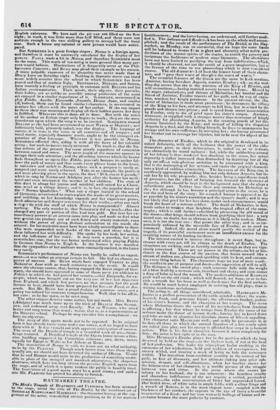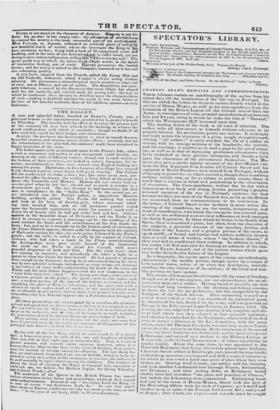HAYMARKET THEATRE.
The Maid's Tragedy of BEAUMONT and FLETCHER has been restored to the stage, tinder the title (ir 7%e Bridal, by the combined art a SHERIDAN KNOWLES sod MacaaAuy : time dramatist having, at the *fig. gestum of the actor, remodelled cem min portions, to fit it for modern fastidiousness; and the lotterhaving, we understand, still further modi- fied it. The i.ielicate and dlfficult ta-Ir has been on the whole well accom- plished; and the result of the performance of The Bridal, at the Hay- market, on Monday, was so successful, that we hope the same bands will he induced to rescue C.( m m glect and obscurity other noble pro- ductions of the master-spirits of the (llama, to enrich the poverty and Invigorate the feebleness of modern stage literature. The alterations have not been limited to purifying the text from indelicacies—which,. it should be observed, are not the result of a gross imagination, 'out the licence of the time to use phrieseolopy which is now csoisidered coarse. The old dramests I lid bate the inmost heart of their charac- ters, and " gave their worst of though:s the worst of work." The essential features of the drama are the same in b ,th versions. Amintor, having forsaken Aspasia, marries Evadne; wh i on the wed- ding-day avows that she is the ntistress of time King of Rhodes, and will so contitme,—having married merely to save her fame. Moved by the anger, exhortations, and threats of Melatitius, her brother and the friend of Amintor, Evadne repents of her guilt, and, by way of expia- tion, murders her kingly paramour. In the present version, the chas racter of Melantius is made more prominent : he denounces the villany of the King to his face, and attempts to kill him, but is seized by the guards and thrown into prison ; tend is saved from secret assassination. by Evadne, only to die of grief upon his sister's corpse. Antintor, moreover, is supplied with a stronger motive than reverettce of kingly authority for abandoning Asensio, ill time seeming proofs of her dis- honour furnished by time King; and instead of killing the disguised Aspasia in a duel, and then killing himself, he lives to recompense her wrongs and his own sufferings, by marrying her ; she having personnted leer brother not to revenge her injuries, but to be near the object of her love.
The character of Evadne, which in the original is -developed in its naked deformity, Ivith all the boldness that the power of the elder dramatists gives to their delineutions, is veiled PO as to irdicate less obtrusively its moral ugliness : bet, while the unblushing avowal of her infamy is thus rendered less shocking to the sense, her actual depravity is rather increased than diminished by depriving her of the only set-off—a vain-glorious ambition to he connected with a king, that is the mainspring of her actions, and exalts the original character into a kind of stiblime crimittedity. The baseness of the King, too, is needlessly aggravated, by making him not only defame Asensio, but in- sult her by his vile proposals : this, besides being a supeithious touch of grossness, has the effect of loingitig too forward the character of Aspasia, which should lw beet in the background now that she plays a subordinate part. Neither was there arty occasion for 111elantitis to die; for although he has become a principal actor in the scene, he is not the real hero of the story: his %sounded honour is appeased as far ems possible by his sister's eontrition Bed the tyrant's death ; and it was not likely that grief for her loss Hittite, under such circumstances, would break the heart of a veteran soldier. The death of Melantius, in fact, tends rather to weaken than heighten the tragical effect of the catas- trophe; which is still further enfeebled by preset ving the old moral of the dranso—that kings should refruiti from grotifying their lust : a very sound one, no doubt, but as obvious as it is likely tube useless. More- over, it is not the true one : that points the other way ; and is so im- pressively enforced by the miserable fate of Erudne, as to need no comment. Indeed, the moral alone would justify the revival of the tragedy, if its powerful excitement were an insufficient excuse for the revolting nature of its leading incidents.
The interest excited is intense throlighout: it never flags, but in- , creases with every act, till its climax in the death of Evadne. The situations are striking, and as forcibly carried through as they are vigo- rously conceived. There are no pauses in the action—no let or hin- drance to the free course of the passion, that burns onward like a stream of molten ore, glowing and sparkling with its heat, and consum- ing every thing before it. The characters wage no war of mere words: the conflict is one of purpose and deeds—the opposition of will to will. The dialogue is like sword.play: each senteisce falls with the weight of a blow dealt by a nervous arm, trenchant and sharp; and till0t1 conies a drop of balm to heal the wound. The modern additions of KNOWLES graft well on the old stock ; which will flourish, we hope, so as to fur- mush a wreath for his brow as well as fresh ones for the first authors. He would be much better employed in reviving fine old plays, than in writing murderous melodrannes.
'the acting is, all things considered, admirable. MACREADY'S Me- lantins is a perfect persoltation of the. noble- minded soldier; the warm-
heal ted, frank, and generous friend ; the affectionate brother, jealous of his sister's honour, tied the champion of her wrongs. The scene where Alehintius draws the secret of his wretchedness from Arnintor
is ;effecting ; but that where he wrings from Ermine the name of her seducer wider the threat of instant death—forcing her to kneel down and take au oath to obandon ber dissolute rourse of life—is appalling.
lime character suits MACRF.ADY ; and teddy he personates it, as he does all those in which the: !flannel rumpulses of a fine manly spirit
are culled into play, mei his energy is afforded free scope in vehement action. This is his liucst character, because it most completely fits him : the actor is lost sight of in the man. Miss HUDDART'S Evadne places her in the position which she long deserved to hold on the stage—in the. highest rook, if not at the bead
of he r profession. Sloe looks the triumpluoit harlot exulting in the eminence of her wickedness, bold nod reckless of eensequences, but uncasy withal, and wearing tt mask of levity to bide the rottenness within. The transition frotn confident security in the secrecy of her
guilt, to fear of discovery, and her ultimate sinking into utter sub- mission, despair, and self-abhorrence, when her brother shows her
time hideousness of her character, is a terrific picture of the struggle between vice and virtue. In the scene where she avows her infamy to her husband, she is too vehement : the heartless cruelty and shameless indifference of the act respiire a settled, passionless
composure—the culm concentration of bitter but unprovoked hatred. Her bridal dress, of white satin in ample folds, with a silver fringe and a wreath of flowers, is in the most elegant taste : coupled with the blackness of her conduct, she teppears to the eye of fancy a beautiful incarnation of a fiend ; and her true womailly feelings of horror and re- pentance become the more pathetic by contrast. ELTON is not equal to the character of Amintor. Tragedy is not his forte. his mission is but empty rant : the affectation of mirthfulness to euneeal his misery is the most successful part of his perfortnanee. Miss TAYLOR, as Aspasia, redeemed an artifieial piece of acting by one beautiful touch ot nature, where she interrupts ..the King in his base overtures to her ; rising with a look of ill-suppressed scorn and loathing, and in the tone of one determined_amt to suffer insult, yet not daring to give vent to indignation, telling latiii-itgThis is not my suit.". The quiet. quick way in which she utters these ample words, is the result of instinctive feeling, not of study. itaINES personntes the lustful tyrant ; and his active is suited to the chareeter, inasmuch as it has not one redeeming quality.
A new farce, adapted from the French, called My Young Wife and my Old Umbrella, followed ; which EARItEr'S clever acting renders amusing. He personates a miaatabropical mitsic.master—a tuner out of tune. out at elbows, and out of spirits. His disposition, not natu- rally hilarious, is soured by the discovery that some villain has eloped with his old umbrella, arid carded away his young wife : the way in which he confounds their identity in dwelling upon the characteristics of each—tneking it doubtful whether his regret is not more bitter at the loss of his faithful umbrella than of his faithless spouse—is very ludicrous.



























 Previous page
Previous page